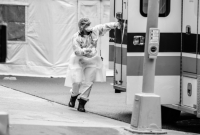Support strong Canadian climate journalism for 2025
On March 23, a friend of a friend tested positive. They’re healthy, and not an elder. Statistically speaking, they should pull through. But the coronavirus reaches closer.
For all the foreboding, COVID-19 still feels distant; abstract. Jobs, bills, debts: these are concrete. These are real. Was it the same way in past pandemics — life as near-normal, but with an ominous edge?
If you’re on a plane and it descends into the clouds, the transition seems momentous. But when you’re in the clouds themselves, it’s mundane. Boring, even. This crisis feels the same way. Maybe that magnifies the differences we notice, as we restlessly wait.
If the visage of Helen of Troy launched a thousand ships, our shortage of Paper of Toilet has spurred a million quips. We’re down to 23 rolls for our family of four — not desperately low, but it’s where we top up our supplies. The future isn’t plastics, it’s bidets.
There were no toilet paper rolls, facial tissues or paper towels to be found at the nearby Save-On-Foods on Monday and Tuesday. A local London Drugs was also sold out, except for the 10-packs of facial tissue people put in their purses and pockets. These get handed out as promotional freebies at train stations in Japan, so every time we travel there, we stock up. Post-virus, maybe they’ll replace notepads as realtors’ promotional materials of choice.

My search continues. I stopped laughing at friends who bought the lasts-a-month “Charmin Forever Roll,” currently out of stock. They’ll probably feature in every earthquake-preparedness kit sold from now until the end of time. They’ll definitely be in mine.
The denuded shelves where fresh meat and frozen vegetables once sat reminded me of Vancouver’s Expo 86. My grandfather’s sister had visited us from Siberia; she spurned the fair to spend hours a day in supermarkets, marvelling at all food. I’ll think of her again when the crisis fades and the stores are full.
Bad as things were in Siberia, she at least had safe drinking water — probably. Communist Party officials had to live there, too. In the scheme of things, clean water isn’t that high of a bar.
A few aisles over, the flour, white and brown sugar, and chocolate chips were all but gone, as if every other parent minding their kids had thought of baking cookies, too. The “fake” sugars — Stevia, Truvia and the like — were still well-stocked. When they disappear, we’ll know things are dire.
A handful of other shoppers wore masks, mostly the dental hygienist type. Air gaps from my beard probably impaired the effectiveness of mine. I’ve now got one N95 mask, so the facial hair will have to go. If I bothered to get a better mask, I can bother to shear the beard. In future pandemics, politicians and community leaders going clean-shaven could underscore the severity of the crisis. Like “Movember,” but in reverse.
Almost no one wore gloves, something I only noticed after bare-handedly picking through avocados (Note: for salsa, not toast). Every hand that touched them might as well have touched mine, and the very few — very few — avocados I pinched and put back, have by now been eaten by others.

Japanese and East Asian grocers consume mountains of plastic, selling machine-wrapped produce on Styrofoam trays. It wouldn’t surprise me if, post-coronavirus, the Superstores and Walmarts of the world followed their lead. Responsible employers minimize their employees’ and customers’ risks of harm, and prepackaged produce seems like an inevitable next step.
Good luck to single-use plastic activists bumping up against perceptions of shoppers’ safety. The chemical engineer in me knows we can recycle those plastics; the environmentalist in me dreads that we’ll have to.
I can’t imagine Canadians wearing disposable gloves during flu season — I don’t even think that’s a thing in Japan — but I can foresee disposable masks quickly becoming commonplace. Especially once Lululemon, Nike and others create stylish $50 accessories to fit atop the styleless 50-cent masks, conceal the strings in the back, and match people’s commuting attire. Bandanas for yuppies, basically.
Those product plans will have to wait. Normalcy seems an eternity away. In the tyranny of “now,” our collective crisis escalates. I’m not sure if viruses can cause heart attacks, but COVID-19 has given the world something like cardiac arrest: from jobs to schools to leisure activities and more, much of our social circulation has abruptly stopped.
We’ll all be chaperoned by inconvenience, anxiety and grief until the crisis is done. But someday the recovery will come. And then it’ll feel great to obsess over frivolous things again. On which topic, if my mask-over-mask idea actually has merit (and this would be a first), I’ll happily accept royalties in the form of cash, yoga mats or sneakers. Or toilet paper.







Comments